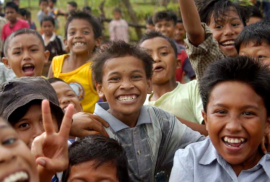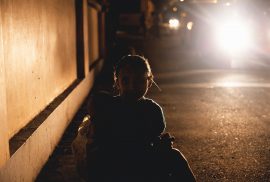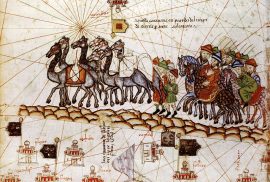Whilst the terms ‘climate change’ and ‘global warming’ are now frequently heard in a number of contexts, whether that be in a professional environment, the classroom, or in your Facebook newsfeed, it can sometimes be difficult to understand why such notions are so alarming – the opportunist may just see these changes as an excuse to flaunt their favourite t-shirt for a few more days a year. However, the ramifications of climate change go far beyond a jacket collecting more dust in your wardrobe. Changes in climate induced by a warming planet are anticipated to spark challenges in social, economic, and political conditions across the globe, particularly within the ASEAN region. In light of this, as a simple game theory model suggests, collaboration of partners within ASEAN, although not always perceived as the easiest and most lucrative path in the short-term, will ultimately be the most rewarding approach, and will play an essential role in harnessing future regional stability and prosperity.
Academic Essay
The word ‘transgender’ may be familiar to our ears. This word meant in this article means people who have gender identity or gender expression that is different from the gender they had at birth, from woman to man, or vice versa.
Southeast Asia is one area where religion is the most considered factor, so transgender is often considered to be against the norm. Not infrequently in Southeast Asia, transgender gets discriminated, especially to enjoy a decent life. In fact, they are often forcibly evicted, fired, and so on. In fact, transgender is a human being and a citizen who has human rights. In addition, it must always be remembered that the state is obliged to provide protection to its citizens, without exception. Thus, we need to highlight this transgender phenomenon.
Nationalism is an endless thing. It must be inherited continuously through education, slogans, and of course the existence of ‘others’. In the context of inter-state relations the existence of ‘others’ will become more complicated if the national identity of other nations has come into contact in open conflict. In other words, ‘others’ would be considered an antagonist if history presents a collective memory of inter-state conflicts.
In Southeast Asia, conflicts between nations are not new. The confrontation between Malaysia and Indonesia at the end of the Old Order is one example. However, since the establishment of ASEAN 50 years ago, open conflicts between Southeast Asian nations incorporated in ASEAN have almost never been heard. This is because the countries incorporated in ASEAN agree not to interfere with the sovereignty of other countries in politics or ideology. With the agreement they hope to create peace in the region of Southeast Asia.
Pasung is the traditional practice of dealing with people with psychological disorders, or those perceived as such. It consists of binding people, often with chains, and locking them in small rooms, cages or sheds. It can last anywhere from a few hours up to many years. Although it was banned in Indonesia in 1977, it is practiced to this day, especially in rural areas.
I must admit that when I heard about pasung for the first time I was quite shocked. It was the cruelty and callousness of people that struck me most. However, the documentary film Breaking the Chains, released in 2015, made me look at the issue from a wider perspective. Its creators did not focus on how brutal people who condemn their loved ones to such fate are, but rather showed how complex their situation is, that is how many elements affect the decision to take such a step.
Indonesia is one of the many developing countries located in Southeast Asia. With the level of health, education and income that has not been said to be sufficiently good, the Indonesian people do not appear to have fallen living life as citizens of developing countries with many polemics which often arise from various aspects of life. Even in 2014, Indonesia’s happiness index rose with a considerable percentage difference for a period of one year.
Reporting from the website of the Central Statistics Agency [1], the significant increase in happiness index was 3.17 percent, where in 2013 Indonesia’s happiness index was 65.11 and in 2014 Indonesia’s happiness index rose to 68.28. Based on Dream.co.id’s online newspaper website [2], there is no mention of what percentage of the increase in happiness index of other countries, but with the presence of several countries, especially developed countries, which even fell in rank, the increase in numbers scored by Indonesia could be quite high.
Notwithstanding the constant efforts to tackle Trafficking in Persons, this form of modern slavery is still widespread in Southeast Asia where all the countries in the region are country of origin, destination or both. It is often argued that strategies to combat trafficking have been focusing more on law enforcement and assistance to victims rather than on prevention, hindering the ability of governments to have a significant impact on the issue. In order to eradicate Trafficking in Persons, a more comprehensive approach is needed and prevention strategies should be prioritised.
“As a region with a wide territory, relations between the periphery and the center of power in ASEAN are often colored by negative stereotypes due to cultural differences. Surprisingly in the midst of a negative stereotype that developed, the outer areas or often referred to as frontier are still continuously built endlessly for the future hopefuls that unfortunately often cause social and environmental problems ”
The term frontier in the social science universe was originally used by Jackson Turner to explain the American mentality. The term is used to describe the customs of American colonists in exploring and building civilizations in the outer regions found in the new continent. The habit arises because of the view that the outermost is an area full of resources but still underdeveloped. Therefore the area needs to be continuously exploited in order to advance so that it can produce profit for human.
The Silk Road is an ancient trade route connecting the West and East, a German researcher named Von Richthofen named it The Silk Road in the 18th century CE. The name of the Silk Road is taken because Chinese commodities trade in a lot of silk. Frances Wood in his book The Silk Road: Two Thousand Years in the Heart of Asia says the path of the Silk Road has many branches from the Chinese Tang Dynasty capital in the east to Rome, the capital of Italy to the west. The line was opened by a general named Zhang Qian from the Han Dynasty. Tracing the road will pass through Afghanistan, Uzbekistan, Iran, and up to Alexandria Egypt. Also found other branches that pass through Pakistan, Kabul, Afghanistan to the Persian Gulf [1].
According to data from the annual Reporters Without Borders [1] report on the ranking of press freedom in the world, for the Southeast Asia region, Indonesia ranked top, namely 124th, followed by the Philippines in 127th position. The next ranking is occupied by Myanmar which was previously ruled by the military but is now led by the former opposition party, ranked 131. Next is Cambodia, which is controlled by Prime Minister Hun Sen, ranked 132. Thailand is ranked 142, followed by Malaysia in the order 144th, Singapore ranked 151th, and Brunei was 156th. The two Southeast Asian countries in the lowest position are Laos (170) and Vietnam (175) classified as media black spots.
The problem of prostitution is endless. In addition to the many opposing parties, there are still a handful of supporters. Although considered immoral by most people, but the sex industry is still surviving until now around the world. No matter how intense the government declares illegal, it is not easy to make prostitution vanish from a country because there is always a need. In Southeast Asia, Thailand is famous for its sex tourism. Boonchutima (2009) stated that the government of the White Elephant has been trying to change the image by promoting other tourisms such as cultural tourism. But unfortunately, a thick Thai image of sex tourism has not changed.










